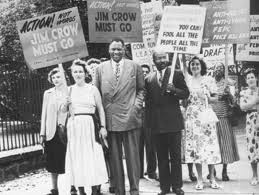Civil Rights

OVERVIEW:
Money and wealth in the United States is increasingly concentrated in the hands of a few – mostly older white males. They are the less than 1% who disproportionately fund political campaigns, deciding who runs, who wins, and what they vote for. It is no wonder, then, that our government’s policies and laws reflect their priorities, and that our elected officials overwhelmingly come from a similar demographic.
- People of color make up 31% of the population but only 11% of elected state legislators and 14% of Congress.
- Candidates of color have a more difficult time raising money and therefore are typically underfunded.
- Civil rights enforcement in our country has lagged.
- The greatest amounts of campaign cash come from neighborhoods where wealthy, non-Hispanic white populations dominate.
- Many states have passed voter suppression laws restricting access to the vote by poor people, especially people of color, as well as students and senior citizens.
- The United States has a higher percentage of its citizens in jail than any other country the world. Mass incarceration in the United States affects people of color the most. African Americans are 13% of the US population, but 38% of prison inmates; Latinos are 17% of the US population, but 33% of prison inmates; White comprise 63% of the US population, but 58% of prison inmates.
- The private prison industry makes billions of dollars of profit each year, and is a major donor to election campaigns.
IN-DEPTH:
THE PROBLEM:
One hundred and fifty years after the Reconstruction Amendments and more than a generation after the civil rights revolution, achieving true racial equity remains a central challenge of our time. Both structural barriers and racially biased policies contribute to a racial wealth and income gap that is higher today than at any point since the Federal Reserve began tracking it 30 years ago.
The drive for racial equity in America faces a major problem – the role of private wealth and big business in our political system. The undemocratic role of big money is especially exclusionary for people of color, who are severely underrepresented in the “donor class” whose large contributions fuel campaigns and therefore set the agendas in Washington and state capitals across the country.
Race intersects with our big money system in two important ways. First, because donor and corporate interests often diverge significantly from those of working families on economic policies such as the minimum wage and paid sick leave, people of color are disproportionately harmed because a larger percentage are poor or working class.
Second, and more profound, our nation’s legacy of racism and persistently racialized politics depresses the political power of people of color, creating opportunities for exploitation and targeting—exemplified by mass incarceration, and voter suppression laws. The dominance of big money in our politics makes it far harder for people of color to exert political power , get elected to office, or effectively advocate for their interests as both wealth and power are consolidated by a small, very white, share of the population.
BUT THERE’S HOPE:
Publicly funded elections hold the promise of changing this imbalance. Where publicly funded elections exist today, in places like New York City, Maine and Connecticut, it is possible for candidates of color and others of modest means to compete financially—even against candidates who run depending on large private contributions.
The public financing system in Arizona is a good example. There, the percent of candidates of color has increased each election since 2000, when the program was introduced. And the percent of candidates of color who use public financing for their campaigns has jumped substantially each year.
In fact, candidates of color use public financing to a greater degree than their white peers. Many say the availability of public funding was an important factor in their decision and ability to run for office. In a survey of candidates of color by the Fair Elections Institute, an overwhelming number said they could not have afforded to run without the availability of public funds.
Increasingly, the fight for publicly financed campaigns is seen as a critical component of the broader struggle for racial justice and civil rights. National organizations like the national NAACP and others have endorsed public financing as an important way to empower candidates of color. It is a critical step within the broader agenda of equality. Public financing campaign reform is the first step to giving back democracy to all the people.
Publicly funded elections play a critical role in creating a government of, by and for the people, rather than the big funders. The movements for campaign finance and civil rights have a similar goal —to develop a political/electoral system whose outcomes are determined not by wealth or race, but by notions of fairness, justice, equality and democracy.
Further reading: https://www.demos.org/research/stacked-deck-how-racial-bias-our-big-money-political-system-undermines-our-democracy-and